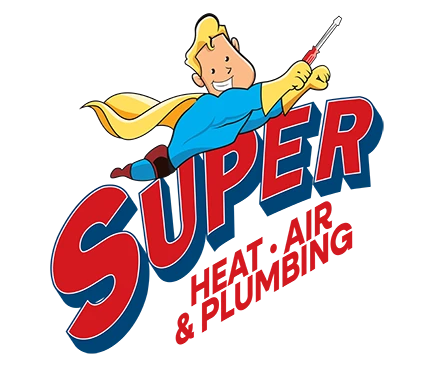The heating and cooling industry uses a lot of acronyms that may leave you scratching your head as to what they might mean. In fact, HVAC (heating, ventilation, and air conditioning,) is the acronym that we use to define our entire industry!
Confused by the terms that you hear about air conditioning and heating? Don’t worry! Our team at Super Heat, Air, and Plumbing is here to cut through the confusion and discuss some common acronyms that you might come across. Let’s go!
SEER
Stands For: Seasonal Energy Efficiency Ratio
The SEER rating calculates an air conditioning system’s cooling output throughout a typical cooling season divided by the energy it uses in Watt-Hours.
SEER ratings range from 13 to 22, and The U.S. Department of Energy enforces minimum SEER ratings by region in the United States. Here in Florida, new AC systems must have a SEER of at least 13. Since older air conditioning units have a SEER of 8 or less, a new unit with even the lowest available SEER rating would be a step up towards better efficiency.
Keep in mind, the higher the SEER, the more comfortable you’ll be, and the more efficient your system will be. Combining a more efficient AC unit with insulation, air sealing, and other energy-efficient technologies can save a good amount of money on monthly heating and cooling costs.
Keep Reading> SEER Ratings Explained
MERV
Stands For: Minimum Efficiency Reporting Value
This acronym relates to air quality and measures an air filter’s performance by how small of a particle it can capture from the air circulating in your home. MERV ratings range from 1-20. The smaller the particle that the air filter can catch, the higher its MERV rating.
Generally, an inexpensive throwaway filter has a MERV of 4 to 6 and can filter out dust and lint. These filters are designed to protect your HVAC from getting bogged down by debris.
For better air quality throughout your home, you will need a filter with a MERV rating of 8 to 13. These filters can filter out smaller contaminants like pollen, pet dander, and even certain airborne bacteria.
You might be thinking, well, if a MERV rating of 13 is good, wouldn’t a MERV 20 be better? Not quite. While filters with MERV ratings that high do an amazing job of filtering out tiny particles in the air, they are considered hospital grade. Tight mesh screen air filters with a MERV of 20 would restrict the airflow in a residential HVAC system and impact overall efficiency.
AFUE
Stands For: Annual Fuel Utilization Efficiency
If you are shopping for a new furnace, AFUE is something that you will want to pay close attention to as it has an impact on your annual heating costs.
The AFUE ratio measures how efficiently your heating system consumes fuel. For example, a furnace that converts 80% of fuel into heat has an AFUE of 80%. The remaining 20% is considered waste during the heating process.
It is mandated by the U.S. Department of Energy that new furnaces must meet a minimum of 80% AFUE. The good news? Today’s top-of-the-line heating systems surpass that minimum standard. Most modern heating systems achieve an AFUE of 95% or higher, leaving very little energy to waste.
Of course, living in Florida, our heating needs are minimal, and a base model will provide adequate heating during the cooler months but will cost much less.
HSPF
Stands For: Heating Season Performance Factor
If you have a heat pump, this acronym should be important to you. The HSPF measures the heating performance of your heat pump. The higher the HSPF, the more efficient the heat pump is when it is in heating mode.
The minimum energy efficiency standard for heat pumps is currently 8.2, but some current heat pump models have an HSPF of 10 or higher.
Since we live in sunny Florida, you don’t need to worry so much about the efficiency of your heating system. If you have a heat pump, the rating that you should be most concerned with is the heat pump’s SEER rating since you’ll be using your heat pump to cool your home too.
Learn More> Why Heat Pumps are a Safe Investment
Heating and Cooling Pros
Now that you’ve been through the Super Heat, Air, and Plumbing crash course of HVAC acronyms, we hope you have a better understanding of them so the next time you need to buy a new heating or cooling system, you’ll be able to compare different models and find a system to best suit your needs.



